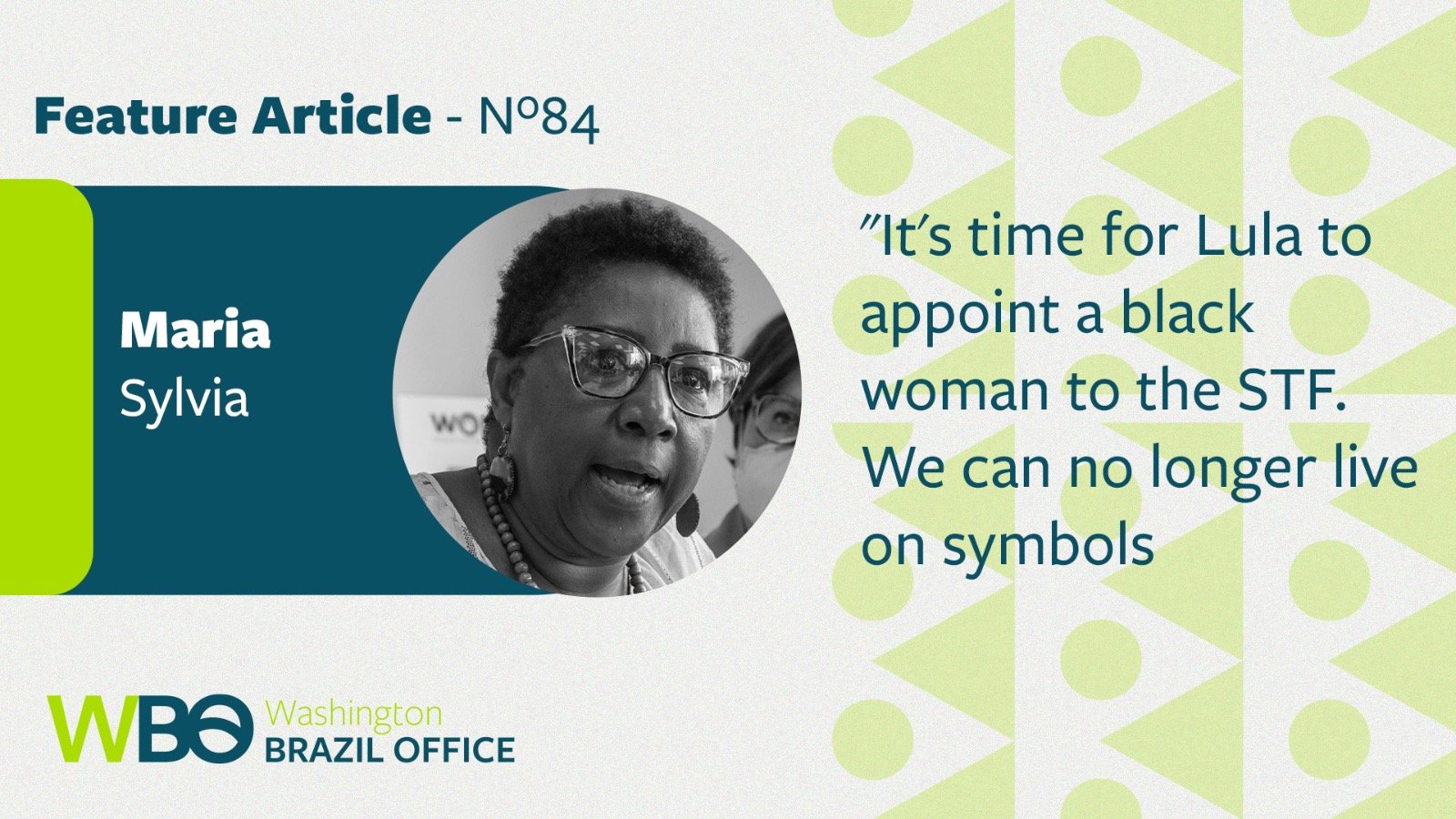Why Lula Should Nominate a Black Woman to the Supreme Court
Maria Sylvia de Oliveira is a lawyer, coordinator of Policies for the Promotion of Gender and Race Equality at Geledès-Instituto da Mulher Negra and a Master's student in the Postgraduate Program in Humanities, Rights and Other Legitimacies – Diversitas at the Faculty of Philosophy, Letters and Human Sciences of the University of São Paulo (FFLCH/USP). This text was originally written for issue 84 of the WBO Newsletter, published on September 15, 2023. Fill in the form at the bottom of the text to access and subscribe to the WBO weekly newsletter in English.
Ever since the retirements of Supreme Court Justices Ricardo Lewandowski and Minister Rosa Weber were announced, there has been an expectation that President Luiz Inácio Lula da Silva would nominate at least one woman, and that she would be Black, to occupy one of these seats.
Expectations are valid. In its 132 years of existence, only three women, and all of them have been white, have sat on the Brazilian Supreme Court (STF), which has eleven members. In these 132 years, no Black woman was even considered as a possibility of taking a seat on Brazil’s highest court.
On the date of his inauguration, President Luiz Inácio da Silva walked up the ramp of the President Palace accompanied by representatives of the country’s discriminated populations, which included a Black woman and a Black child, signaling that his government would pay attention to these people who helped re-elect him to the presidency. In his inauguration speech, Lula said: “It is unacceptable that we continue to live with prejudice, discrimination, and racism.” It is time for President Lula himself to take the first step in confronting racism in Brazil by nominating a Black woman to the Supreme Court. We can no longer live on symbolism alone.
A truly democratic country must mirror the society as a whole in its institutions, and it must be responsive to the population. Therefore, it is extremely important to defend diversity in the highest court in the country and, more than that, defend the appointment of a Black woman to a vacancy on the STF.
The position requires the nominee to have outstanding and widely recognized legal knowledge and an unblemished reputation, adjectives that are common among Black jurists, practitioners of the law, and many of whom are recognized internationally for their work. They do not lack competence.
It is extremely important to change our perspective on the judicial system so that it will truly guarantee justice. Justices on the Supreme Court must see the Federal Constitution as an instrument for transforming society, and their legal interpretations must reflect a commitment to concretely guaranteeing the principle of equality, which includes seeking the emancipation of discriminated groups. True justice, equity, solidarity, and well-being are non-negotiable values.
The recent episode involving Sônia Maria de Jesus, a 49-year-old Black woman, deaf and mute, who since the age of 9 was engaged in domestic work considered to be “analogous” to slavery is a case in point. She labored in the home of Judge Jorge Luiz Borba of the Santa Catarina State Court of Justice, a man who should have complied with the laws. However, Supreme Court Justice André Mendonça ordered that the victim had to return to Borba’s home. This example shows us why there is a pressing need to guarantee racial plurality on the Supreme Court.
“In its 132 years of existence, only three women, and all of them have been white, have sat on the Brazilian Supreme Court (STF), which has eleven members”
The Inter-American Convention Against Racism, Racial Discrimination and Related Forms of Intolerance, which was approved by the Congress as decree No. 10,932 in January 2022 with the status of a constitutional amendment, states in article 9: “The different states must undertake to ensure that their political and legal systems adequately reflect the diversity of the society in order to meet the legitimate needs of all sectors of the population in accordance with the scope of this Convention.” The appointment of a Black woman to the Brazilian Supreme Court, therefore, is supported by an international convention to combat racism.
On the other hand, the National Council of Justice, aware of the need for profound changes in the judicial system, launched the National Judiciary Pact for Racial Equity, which consists of the “adoption of programs, projects, and initiatives to be developed in all areas of the judiciary and in all jurisdiction, with the aim of combating and correcting racial inequalities, through affirmative, compensatory, and reparatory measures to eliminate structural racism within the scope of the judiciary.”
The attacks that are being directed at the campaign and its creators to sensitize society and President Lula in favor of the appointment of a Black woman to the STF are proof that sectors of the so-called democratic and progressive Left are racist and cannot conceive of Black women anywhere other than in complete subalternity. It is urgent and necessary for the Brazilian State, now in the person of President Lula, to take a step towards dismantling systemic and institutional racism.
“States must show stronger political will to accelerate action for racial justice, redress the past and create equality through specific, time-bound commitments to achieve results,” says Michelle Bachelet in the Report of the United Nations High Commissioner for Rights Human. This entails the “promotion and protection of human rights and fundamental freedoms of African and Afro-descendant people against the excessive use of force and other human rights violations by police officers.”
President Lula has in his hands the opportunity to set an example by appointing a Black woman to the Federal Supreme Court, providing reparatory justice, and making a mark on the country's history.

